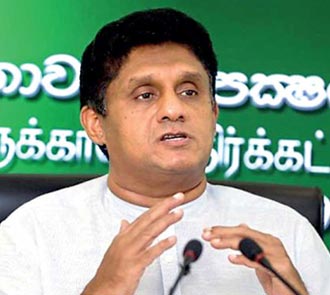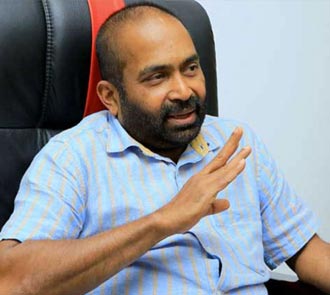Tuesday Feb 17, 2026
Tuesday Feb 17, 2026
Monday, 11 December 2023 03:49 - - {{hitsCtrl.values.hits}}
 |
| SJB Leader Sajith Premadasa |
 |
| State Minister of Finance Ranjith Siyambalapitiya |
 |
| SJB MP Dr. Harsha de Silva
|
The Government and the Opposition yesterday got vocal over the increase in the rate of Value Added Tax (VAT) from 15% to 18% from 1 January 2024 and the removal of exemptions of nearly 100 products and services.
Opposition Leader Sajith Premadasa yesterday said the Government’s move to increase the VAT is unjust.
Addressing a press conference, Premadasa said the people are now suffering the consequences of the Government’s inefficiency since 2020 leading to the decline in Government revenue and the country’s eventual bankruptcy. “Sri Lanka also lost access to international capital markets as Government revenue as a percentage of GDP declined from 12% to 8%,” he highlighted.
The opposition leader said the country has experienced significant brain drain attributed to an inefficient tax policy, resulting in the departure of lecturers, doctors, engineers, and computer professionals. “In response, 47 organisations have put forth a proposal to implement a transparent and reasonable tax formula to prevent the decline caused by this exodus,” he noted.
Despite the VAT hike coming into effect from 1 January, the State Minister of Finance Minister Ranjith Siyambalapitiya yesterday in Parliament expressed confidence in an imminent reduction of oil prices and electricity tariffs.
During the Parliamentary debate on the VAT Amendment Bill yesterday, he attributed this optimism to the recent drop in global fuel prices and the optimal hydropower generation capacity resulting from abundant rainfall.
Unveiling the proposed changes, he announced that VAT exemption extended to 97 items are set to be removed from 1 January as the VAT threshold increases from 15% to 18%.
He anticipates that these amendments will contribute to a 1.2% boost in State revenue, amounting to a substantial Rs. 378 billion.
In the 2024 Budget, the Government envisages a revenue of Rs. 4.1 trillion. Of that figure tax revenue is Rs. 3.8 trillion including Rs. 2.2 trillion from taxes on goods and services up from Rs. 1.3 trillion in 2023.
Noting that the Government previously allocated Rs. 65 billion for social welfare, he said it has now proposed to increase it to Rs. 209 billion in 2024.
Siyambalapitiya expressed the Government’s commitment to financial self-sufficiency, highlighting the necessity to generate revenue independently, even with prior assistance from the International Monetary Fund (IMF).
“Looking ahead, the Government aspires to increase the revenue generation to the GDP from 9.1% at present to 12.5% by 2024 with a further target of 15% by 2025. Economic reforms are already underway to achieve these ambitious goals,” he said.
Siyambalapitiya revealed that direct and indirect tax rates, previously ranging from 20:80 have now been adjusted to 30:70. Proposals for additional revisions are included in the 2024 Budget.
Addressing concerns about the expansion of VAT, the State Minister clarified that exemptions persist for essential items, such as medicines, equipment for disabled individuals, rice flour, wheat flour, vegetables, fruits, liquid milk, school equipment and the ‘Suwasariya’ ambulance service.
However, he acknowledged that the proposed amendments might result in a slight uptick in inflation, ranging from 1.5% to 2%.
SJB MP Dr. Harsha de Silva at a separate media briefing yesterday accused the Government of trying to deceive the public by providing the list of 97 items facing an increased 18% VAT only in English, neglecting both Sinhala and Tamil languages.
De Silva noted that while the Government has decided to levy an 18% VAT on 97 items, the list has only been presented in English.
“Even if a loin cloth is produced locally but in a factory which is outside an investment promotion zone, an 18% VAT would be applied to it,” he pointed out.
“The Government is planning to implement an 18% VAT on 97 items. The list of these items, including nutritional food, locally produced coconut milk, machinery, telephones, electronic equipment, and medical equipment, is provided only in English and not in Sinhala or Tamil,” he noted.
The MP stressed that while the opposition recognises the need for VAT as part of the country’s recovery and understands the Government’s difficult circumstances, it is crucial not to withhold information from the public.
He called on the Government to be forthright with the public and disclose the items that will be subjected to VAT. “The Government is attempting to impose VAT on diesel, gas, and petrol while keeping it hidden from the people,” he alleged.
“18% VAT will be charged on all things such as the farmer’s loin cloth, mamotee blades, fertiliser, tea leaves, rubber, copra,” the MP revealed.